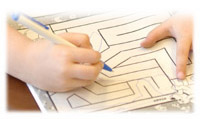What is involved in a neuropsychological
evaluation? Interviews Interviews
Parents meet with the neuropsychologist to answer questions
about the child’s developmental and medical history,
school performance, behavior, and socialization.
Specialized testing
Neuropsychological evaluations are uniquely powerful because
of the specialized, validated test instruments and behavioral
observations used and interpreted by the neuropsychologist.
Neuropsychological tests assess a broad range of domains:
 General intellectual ability General intellectual ability- Academic achievement, such as reading, writing, and math
skills
- Social and emotional functioning
- Personality and mood
- Learning and memory
- Speech and language skills
- Visual-spatial skills
- Gross and fine motor coordination
- Attentional processes
- Executive functions, such as planning, cognitive flexibility,
inhibition, and ability to follow instructions.
The typical pediatric evaluation involves 2 days (5-6 hours
each) of one-on-one testing with your child. The length of
the evaluation may vary depending on the needs of your child.
 Consultation Consultation
With your permission, the neuropsychologist will consult
with 2-3 other professionals who are familiar with your
child in order to gain the most complete understanding
of your child.
Interpretation of results
The neuropsychologist analyzes and integrates all of the
information. Your child’s performance is compared
to other children of the same age and grade, and is contrasted
with your child’s abilities in other areas. Parents
join the neuropsychologist for a feedback meeting to discuss
the results.
Report and recommendations
Neuropsychological reports are thorough, descriptive, and
action-oriented. They include both detailed study results
and summaries understandable and useful to a variety of
audiences. The treatment plan is tailored to your child,
and includes interventions that have been shown to be effective
as well as specific steps and resources needed for successful
implementation and progress measurement. In addition, you
will be given a list of helpful resources (e.g., books,
articles, and websites) specific to your child’s
developmental profile.
Referrals to other professionals
If appropriate, your child will be referred to other specialists
who will gather additional information or provide treatment.
Your child, for example, may be referred to a pediatric
psychiatrist for a medication evaluation, to a child psychologist
for therapy, or to an education specialist for state-of-the-art
interventions.
|
|
|

